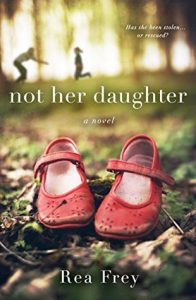Molly’s guilt sends her running away from her family, inadvertently into a dangerous situation, Angry as she is, her daughter feels something is wrong, and so Nicole searches for her mother. Dear Reader must truly stretch belief at the climax, but still, it’s a good thriller, with lovely ambiguity, a creepy little child, and shattered family dynamics. I was fortunate to receive a digital copy from the publisher St. Martin’s Press through NetGalley.
Tag Archives: kidnapping
What Lies Below by Barbara Taylor Sissel
 Gilly has “visions” that she can’t control and often only frustrate her with their lack of useful details. Jake pushes her to help him find his daughter Zoe who’s been kidnapped, because he doesn’t understand how Gilly’s visions work. Both of their pasts come creeping in to haunt them, endangering Gilly as well. Sissell writes compelling characters with complex backgrounds, which are shared with beautiful and timely exposition, exploring how far-reaching the consequences of poor judgment and denial. The ending’s revelation is astonishing, and heartening, in its humanity. Fans of Diane Chamberlain and Kristin Hannah will appreciate Sissel’s work. It’s a definite must-read!
Gilly has “visions” that she can’t control and often only frustrate her with their lack of useful details. Jake pushes her to help him find his daughter Zoe who’s been kidnapped, because he doesn’t understand how Gilly’s visions work. Both of their pasts come creeping in to haunt them, endangering Gilly as well. Sissell writes compelling characters with complex backgrounds, which are shared with beautiful and timely exposition, exploring how far-reaching the consequences of poor judgment and denial. The ending’s revelation is astonishing, and heartening, in its humanity. Fans of Diane Chamberlain and Kristin Hannah will appreciate Sissel’s work. It’s a definite must-read!
Not Her Daughter by Rea Frey—pub date August 21, 2018
 Sarah’s mother resented her existence, never failing to make her aware of the obstacle she is in life of a woman who believes she gave up fame to be a mother. So she may have been primed for kidnapping a little girl whose mother treated her in a similar manner. After a month on the run with the child, with all that entails—lying to friends and family, shifting work priorities, constant fear—Sarah’s conscience shifts. Coincidentally, her own mother contacts her after a lifetime of absenteeism.
Sarah’s mother resented her existence, never failing to make her aware of the obstacle she is in life of a woman who believes she gave up fame to be a mother. So she may have been primed for kidnapping a little girl whose mother treated her in a similar manner. After a month on the run with the child, with all that entails—lying to friends and family, shifting work priorities, constant fear—Sarah’s conscience shifts. Coincidentally, her own mother contacts her after a lifetime of absenteeism.
As though laying out with tweezers the contents of her life, Frey carefully portrays a mother who never wanted to be a mother in a way that even the most hardhearted reader can squeeze out a bit of sympathy for her. Confused, overwrought, overweight (the character focuses on this fact about herself excessively), she’s suspected of murdering her own child on circumstantial evidence she can’t refute. The fact that the mother wishes to improve herself redeems her, if only just. The child, however, seems way too well-adjusted and mentally healthy for the childhood she was enduring when she was taken. There was no groundwork laid to show her easy ability to make friends or readily accept changes not easily understood by small children. Even severely abused children cry for their mothers, and this one reached for hers after the mother’s hateful words of not loving her, so that completely assimilating into a new life, even a more positive one, so quickly seems to be less than credible. Furthermore, after the surprising turn of events at the climax, the father’s character inexplicably fades away.
This novel raises the question of who we really are to ourselves, as Sarah repeatedly states that she is not a kidnapper, though that is exactly what she is. It also points out the challenges of a legal system that cannot, for practical purposes, factor in emotional abuse of children in removing them from the home, though this seems irrelevant here. It seems unlikely that Montessori school officials would not have notified authorities regarding the bruises that covered the child’s arms and legs. Such obvious signs of physical abuse countered Sarah’s sense of morality. Without that aspect of the mother’s bad parenting, this story would have made more sense.
I was fortunate to receive an early copy from the publisher through NetGalley.